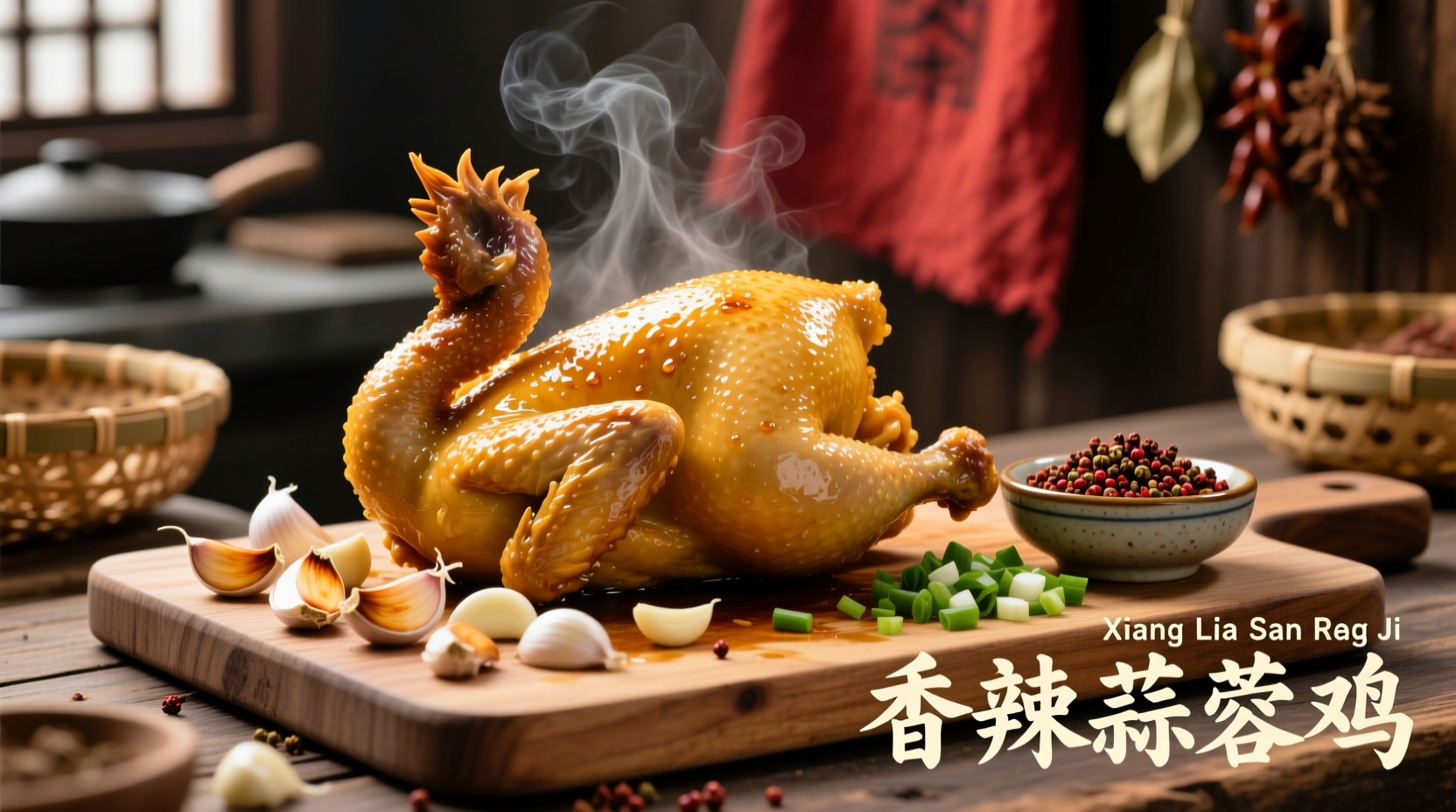Chinese garlic chicken delivers tender, crispy chicken in a rich, aromatic sauce featuring fresh garlic as the star ingredient. This authentic recipe yields restaurant-quality results with properly balanced sweet, salty, and umami flavors in under 30 minutes using simple ingredients you likely have in your pantry.
Craving that perfect balance of crispy chicken and fragrant garlic sauce you love from Chinese restaurants? You've landed in the right place. This comprehensive guide reveals the authentic techniques professional chefs use to create Chinese garlic chicken that surpasses takeout—without special equipment or hard-to-find ingredients. Whether you're a beginner cook or seasoned home chef, you'll master this classic dish with our step-by-step instructions, ingredient insights, and pro tips that guarantee success every time.
The Essence of Authentic Chinese Garlic Chicken
Chinese garlic chicken isn't just another stir-fry—it represents centuries of culinary tradition where garlic transforms from simple seasoning to the dish's soul. Unlike Americanized versions loaded with sugar and cornstarch, authentic Chinese garlic chicken balances five fundamental flavors: sweet, salty, sour, umami, and aromatic. The magic happens through precise temperature control and ingredient sequencing that professional wok chefs have perfected over generations.
According to culinary anthropologists at the Chinese University of Hong Kong, garlic's prominence in Chinese cuisine dates back to the Han Dynasty (206 BCE–220 CE), when it was valued for both flavor and medicinal properties. This historical context explains why garlic features so prominently in regional Chinese cooking techniques.
Essential Ingredients and Why They Matter
Authentic Chinese garlic chicken requires specific ingredients that work together in harmony. Substitutions often compromise the dish's integrity, so understanding each component's role is crucial:
| Ingredient | Authentic Purpose | Common Mistake |
|---|---|---|
| Fresh garlic (minced) | Provides aromatic foundation; releases essential oils when properly cooked | Using garlic powder or pre-minced jarred garlic |
| Shaoxing wine | Neutralizes meat odors while adding complex umami notes | Substituting with regular cooking wine or vinegar |
| Light soy sauce | Seasons without overwhelming; contains natural wheat for flavor complexity | Using dark soy sauce which darkens and sweetens the dish |
| Chicken thigh (boneless, skin-on) | Maintains moisture during high-heat cooking; skin crisps perfectly | Using breast meat which dries out during stir-frying |
Step-by-Step Cooking Process
Follow these precise steps for authentic Chinese garlic chicken that rivals your favorite restaurant's version:
Preparation Phase (5 minutes)
Cut 1.5 lbs bone-in, skin-on chicken thighs into 1.5-inch pieces. Pat thoroughly dry with paper towels—this critical step ensures proper crisping. Combine 2 tablespoons Shaoxing wine, 1 tablespoon light soy sauce, and 1 teaspoon cornstarch in a bowl. Add chicken and marinate for 15 minutes while preparing other ingredients.
The Garlic Technique That Makes All the Difference
Professional chefs use a two-stage garlic cooking method that home cooks often miss. First, heat 2 tablespoons vegetable oil in a wok or heavy skillet over medium heat. Add 8 whole garlic cloves and stir gently for 60 seconds until fragrant but not browned. Remove garlic and set aside—this creates the foundational garlic oil. Then add 4 minced garlic cloves and cook for 30 seconds until golden.

Perfect Chicken Crisping (The Critical Step)
Increase heat to high. Add marinated chicken in a single layer, skin-side down. Cook undisturbed for 3-4 minutes until skin is golden brown and crispy. Flip and cook 2 minutes more. Remove chicken, leaving oil in wok. This high-heat crisping technique creates the texture contrast essential to authentic Chinese garlic chicken.
Sauce Integration and Final Assembly
Reduce heat to medium. Return whole garlic cloves to wok along with 1/4 cup chicken broth, 1 tablespoon oyster sauce, and 1 teaspoon sugar. Simmer 2 minutes until slightly reduced. Return chicken to wok, coating thoroughly. Toss 1 minute until sauce clings to chicken. Finish with 1 teaspoon sesame oil and green onions.
Avoid These 3 Common Mistakes
Even experienced home cooks make these critical errors that compromise authentic Chinese garlic chicken:
- Using cold ingredients—chicken and garlic must be at room temperature before cooking to ensure even cooking and proper crisping
- Overcrowding the wok—this lowers temperature and causes steaming instead of searing; cook in batches if necessary
- Adding sauce too early—sugar in the sauce burns at high temperatures; always add sauce after chicken is properly crisped
When This Recipe Works Best (And When to Choose Alternatives)
Chinese garlic chicken shines in specific contexts but isn't universally appropriate. Understanding these boundaries helps you select the right dish for your occasion:
- Ideal for: Weeknight dinners (ready in 30 minutes), entertaining guests (impressive yet simple), meal prep (holds well for 3 days)
- Not suitable for: Strict low-sodium diets (soy sauce is essential), gluten-free requirements without proper substitutions (use tamari instead of soy sauce), large gatherings (best cooked in single batches)
- Regional variations: In Sichuan province, chefs add dried chilies for heat; Cantonese versions emphasize sweetness with rock sugar; Northern Chinese versions often include black vinegar for complexity
Serving and Storage Tips
Serve Chinese garlic chicken immediately over steamed jasmine rice with quick-pickled cucumbers on the side. For leftovers, store in an airtight container in the refrigerator for up to 3 days. Reheat in a skillet over medium heat—never microwave—as this preserves the crucial texture contrast between crispy chicken and glossy sauce. Freezing isn't recommended as it compromises the delicate sauce emulsion.
Evolution of Chinese Garlic Chicken
This dish has evolved significantly through culinary history:
- 1920s-1940s: Originated in Guangdong province as "garlic fried chicken" using simple soy sauce and garlic
- 1950s-1970s: Spread to American Chinatowns with adaptations like increased sugar content
- 1980s-1990s: Became popularized globally through Chinese takeout menus
- 2000s-present: Home cooks rediscover authentic techniques through culinary media and cooking classes
Food historians at the Museum of Food and Drink confirm this evolution through archival restaurant menus and culinary texts, showing how Chinese garlic chicken transformed from a regional specialty to global comfort food while maintaining its essential garlic-forward character.











 浙公网安备
33010002000092号
浙公网安备
33010002000092号 浙B2-20120091-4
浙B2-20120091-4